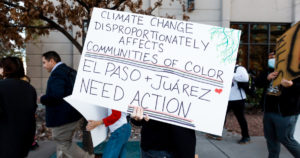
When Nayelly Melendez, a Latina mom of three, said her youngest child was experiencing difficulty breathing, the doctors figured out that where they lived in Chamizal, located in El Paso, Texas, could be a possible explanation for the child’s sudden respiratory issues.
The American Lung Association ranks El Paso as the country’s 13th worst city for ozone pollution. The neighborhood of Chamizal hugs the border with Mexico and is home to about 8,000 people from which over 96% of the community identifies as Latinx.
Melendez belongs to a group of parents, mostly mothers, who have joined environmental groups in a legal bid to get the government to address the air quality issues in the area. Hilda Villegas, also a mother in the community, says the area is treated “like a dumping ground.” Both Melendez and Villegas belong to an organization called Familias Unidas del Chamizal.
According to Clean Air Task Force, the League of United Latin American Citizens (LULAC) and the National Hispanic Medical Association (NHMA), 1.81 million Latinx people in the U.S. live within half a mile of an oil and gas facility. Furthermore, 1.7 million Latinx people live in counties that face a cancer risk above the Environmental Protection Agency (EPA)’s level of concern from toxins emitted by oil and gas facilities.
In 2018, Familias Unidas de Chamizal, and a coalition of other environmental and community groups, sued the EPA. They demanded the EPA reassess the air quality in El Paso and enforce the Clean Air Act. The law regulates emissions of dangerous air pollutants to address the public health risks they might create.
The court sided with the coalition and the EPA officially designated El Paso county as a marginal non-attainment area for ozone pollution. The designation means that new sources of pollution in the area must be regulated. Then, less than two months after the EPA’s new designation, the Texas Commission on Environmental Quality appealed it, paving the way for a longer court battle. However, hope isn’t lost for environmental advocates.
“I think we are at a critical moment where things can change,” said Antonieta Cadiz, the Senior Manager of Latino Engagement for Climate Power.
Cadiz credits community leaders of color across the country, like the members of Familias Unidas de Chamizal, for making sure environmental racism is a topic of discussion at the federal level.

Recent Comments